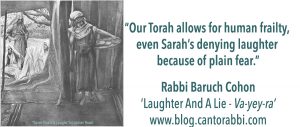LAUGHTER AND A LIE – Va-yey-ra – Gen. 18-22, by Rabbi Baruch Cohon
This week’s Torah story finds Abraham to be a gracious host, welcoming three strangers to his tent, and refreshing them with a midday meal, aided by his wife Sarah, and by their servant. The servant is not named in the text, just called “his boy” and might or might not refer to his son Ishmael who is 13 years old at this point.
The guests accept the invitation to rest and to eat. They eat cheese and milk, then a meal of freshly-slaughtered and cooked calf-meat – clearly a dinner for human beings, even though these guests are celestial. Yes, angels, bringing a message from Heaven. They dignify Abraham by accepting his hospitality, and then they deliver their message which is for both him and Sarah.
“Where is Sarah your wife?”
“She is here in the tent.”
“I will return at the proper time (literally “the time of life” – that is, 9 months) and Sarah will have a son.”
Well, Sarah doesn’t miss a word. She is right behind them in the entrance to the tent. Hearing this prediction, she laughs silently. She is pushing 90, and as the Torah tells us “Sarah no longer had the way of women,” in other words, no period for a long time now. In last week’s reading, Abraham also got the promise of a son by Sarah and it struck some laughter out loud from him – va-yitz-khak — since he was 99 and recovering from his self-inflicted circumcision, and could hardly accept the idea of becoming a new father.
The Heavenly guest doesn’t bring up the subject directly with Sarah, but he asks Abraham: “Why did Sarah laugh?… Is anything too hard for G-d?” At which Sarah speaks up – with a deliberate lie – because she is afraid:
“I didn’t laugh!”
“Lo, kee tzakhakt — No, you did laugh.”
The word for laughter is unmistakable. And it becomes part of the name of the son neither parent expects. Isaac – Yitzkhak. Literally, “he will laugh.”
We will learn more about this long-awaited son in future chapters. His name, ever since then a name borne by countless Jewish men, still echoes his parents’ laughter. Significantly, however, nothing more is made of his mother’s lie. Yitzkhak – “he will laugh” – can still cheer the man who bears the name. But no one is named Y’khakhesh – “he will lie!” Our Torah allows for human frailty, even Sarah’s denying laughter because of plain fear. Sarah remains our honored mother, the first Jewish mother in history, and so symbolically the mother of all converts, the welcomed New Jews. We forgive her fear, and honor her name.



